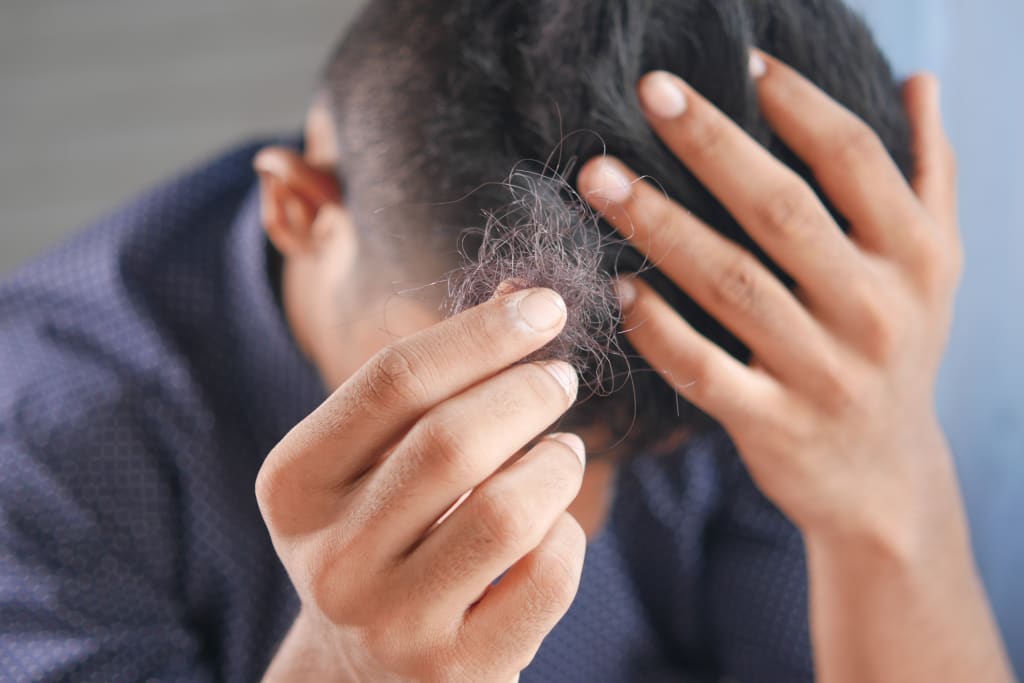
Maintaining a healthy diet:
Maintaining a healthy diet is essential for healthy hair growth and to reduce hair fall. Here are some tips on what to include in your diet:
Protein: Hair is primarily made of protein, so it’s important to get enough protein in your diet. Good sources of protein include meat, poultry, fish, eggs, beans, lentils, and nuts.
Iron: Iron is essential for healthy hair growth, as it helps carry oxygen to the hair follicles. Good sources of iron include red meat, poultry, fish, lentils, beans, and leafy green vegetables.
Vitamin C: Vitamin C helps the body absorb iron, so it’s important to include foods high in vitamin C in your diet. Good sources of vitamin C include citrus fruits, strawberries, kiwi, bell peppers, and broccoli.
B vitamins: B vitamins, such as biotin, niacin, and cobalamin, are important for healthy hair growth. Good sources of B vitamins include whole grains, meat, poultry, fish, eggs, nuts, and seeds.
Omega-3 fatty acids: Omega-3 fatty acids help nourish the hair follicles and promote healthy hair growth. Good sources of omega-3 fatty acids include fatty fish, such as salmon and sardines, flaxseeds, and walnuts.
Zinc: Zinc helps keep the hair follicles healthy and may help reduce hair fall. Good sources of zinc include oysters, beef, crab, nuts, and seeds.
Remember to stay hydrated by drinking plenty of water throughout the day. Dehydration can lead to dry and brittle hair, which may contribute to hair fall.
Use a gentle shampoo:
Sulphate-free: Sulphates are harsh chemicals that can strip the hair of its natural oils, leading to dryness and breakage. Look for a sulfate-free shampoo to avoid this.
pH-balanced: The pH of the shampoo should be similar to that of your scalp, which is around 5.5. Look for a pH-balanced shampoo to avoid disrupting the natural balance of your scalp.
Moisturizing: Look for a shampoo that contains moisturizing ingredients, such as argan oil, coconut oil, or shea butter. These ingredients can help nourish and hydrate the hair, reducing the risk of breakage and hair fall.
Gentle on hair and scalp: A gentle shampoo should be easy to rinse out and not leave any residue on the hair or scalp. It should also not cause any irritation or itching.
Avoid over-washing: Washing your hair too frequently can strip it of its natural oils, leading to dryness and breakage. Try to wash your hair no more than every other day, or even less frequently if possible.
Remember, everyone’s hair is different, so it may take some trial and error to find the right gentle shampoo that works for you.
Manage stress:
Managing stress is important for reducing hair fall. Here are some tips on how to manage stress:
Exercise: Regular exercise can help reduce stress by releasing endorphins, which are natural mood-boosting chemicals. Aim for at least 30 minutes of exercise most days of the week.
Mindfulness meditation: Mindfulness meditation involves focusing on the present moment and observing your thoughts without judgment. This can help reduce stress and improve your overall sense of well-being.
Deep breathing: Deep breathing exercises can help calm the mind and reduce stress. Try taking slow, deep breaths in through your nose and out through your mouth for several minutes each day.
Get enough sleep: Lack of sleep can contribute to stress and lead to hair fall. Aim for 7-8 hours of sleep each night to help reduce stress levels.
Practice self-care: Take time to do things that make you feel good, such as taking a relaxing bath, reading a book, or spending time with friends and family.
Seek professional help: If you are struggling with chronic stress or anxiety, consider speaking with a mental health professional. They can provide guidance and support to help you manage your stress levels
Get enough sleep:
Getting enough sleep is important for reducing hair fall. Here are some tips on how to get a good night’s sleep:
Stick to a regular sleep schedule: Try to go to bed and wake up at the same time every day, even on weekends.
Create a sleep-conducive environment: Make sure your bedroom is cool, quiet, and dark. Use comfortable bedding and pillows.
Avoid caffeine and alcohol: Avoid caffeine and alcohol for at least a few hours before bedtime, as they can interfere with sleep.
Limit screen time: Avoid using electronic devices, such as smartphones, tablets, and laptops, for at least an hour before bedtime.
Relax before bed: Try to wind down before bed by doing a relaxing activity, such as reading a book, taking a warm bath, or practicing relaxation techniques.
Get regular exercise: Regular exercise can help promote better sleep, but try to avoid vigorous exercise close to bedtime.
Consider supplements:
Supplements can be helpful in reducing hair fall, but it’s important to talk to your healthcare provider before starting any new supplement regimen. Here are some supplements that may be beneficial for hair health:
Biotin: Biotin is a B vitamin that is important for healthy hair growth. It may help strengthen the hair and reduce hair fall.
Iron: Iron is important for healthy hair growth, as it helps carry oxygen to the hair follicles. Iron deficiency can lead to hair loss, so if you have low iron levels, your healthcare provider may recommend an iron supplement.
Vitamin D: Vitamin D is important for overall health and may also help promote healthy hair growth.
Omega-3 fatty acids: Omega-3 fatty acids help nourish the hair follicles and promote healthy hair growth. If you don’t eat enough fatty fish or other sources of omega-3s, your healthcare provider may recommend a supplement.
Zinc: Zinc is important for the health of the hair follicles and may help reduce hair fall. If you have low zinc levels, your healthcare provider may recommend a supplement.
Remember, supplements should not be used as a substitute for a healthy diet. It’s important to eat a balanced diet that includes a variety of nutrient-rich foods to support healthy hair growth. Additionally, it’s important to talk to your healthcare provider before starting any new supplement regimen.





Comments
There are no comments for this story
Be the first to respond and start the conversation.